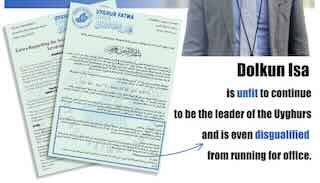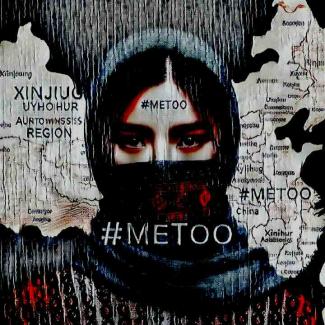End the Violence, Unveil the Truth: The Quest for Justice in the World Uyghur Congress Controversy
Four months ago, on May 10, 2024, the global Uyghur movement received a massive shock by serious allegations of sexual harassment involving two of its prominent leaders: Dolkun Isa, Executive President of the World Uyghur Congress (WUC) headquartered in Munich, Germany, and Nury Turkel, Chair of the United States Commission on International Religious Freedom and Board Member of the Uyghur Human Rights Project (UHRP). The scandal has laid bare many truths - severe organizational failures, systemic corruption, and a blatant disregard for victims' (women's) rights. The mishandling of this situation has not only continued to inflict harm but has also insulted and disrespected the victims (women), with some being disparagingly labelled as "spy bitches."
Academic Call for Transparency
Recently, 31 scholars from across the globe, including 25 Uyghur researchers and international academics, issued a joint statement urging the WUC to improve transparency regarding sexual harassment and the treatment of whistleblowers. The statement, published on July 26, 2024, emphasizes the need for effective mechanisms to document and address such issues of paramount importance independently. This growing academic coalition reflects a strong call for the WUC to address these concerns openly, effectively and conscientiously.
Scandal Overview and Organizational Response
Since the NOTUS, in its publication in May this year (2024), unearthed a sexual scandal by two top Uyghur leaders, the follow-up processes have been marred by suppression of facts, cover-ups and blaming the victims. Needless to mention, one of the authors of this piece had highlighted these bizarre issues earlier in a publication, calling for decisive action against those found guilty of such heinous crimes against women.
The WUC and its affiliate, the Uyghur Human Rights Project (UHRP), have failed to issue a formal apology or deliberately planned not to do so. It, too, has been unable to take any meaningful action against the perpetrators. The organization's attempts to silence dissent and suppress discussion about the scandal have further exacerbated the victims' trauma and damaged the WUC's credibility as a frontal organization for the Uyghur movement across the world. Supporters and cohorts of Dolkun Isa have even harassed female victims and threatened scholars who have spoken out. In an anonymous mail, someone threatened Vanessa Frangville, who raised serious concerns over the scandals involving the WUC and even criticized its leadership.
Systemic Corruption and Neglect
Since Dolkun Isa's ascent to the WUC presidency eight years ago in 2016, following pressure on Uyghur leader and former President of the WUC, Rebiya Kadeer, to withdraw her candidacy for the much-coveted post, the organization has increasingly displayed autocratic tendencies. Isa's tenure has seen the elimination of political opposition and consolidation of power, which has eroded genuine democratic processes and prioritized organizational stability over addressing serious allegations and ensuring accountability. This autocratic shift has been compounded by systemic corruption and neglect, with high-ranking WUC officials like Omerjan, Erkin Sidick, and Rahima Mahmut implicated in covering up harassment allegations. The promised independent investigation has yet to engage with the victims, reflecting a troubling pattern of negligence that undermines the effective resolution of the scandal.
Recent Developments and Implications
Last month, on August 4, 2024, the WUC held its 8th General Assembly, where Dolkun Isa announced his decision to step down temporarily, pending a fully independent investigation. It took nearly three months for such a decision. One can understand his arrogance as well as insensitivity towards the victims of sexual harassment. However, this move seems more strategic than substantive, as Isa remains eager to participate in upcoming elections. Concerns have arisen regarding potential bias in the investigation, particularly with recent changes in the investigator's designation from "human rights specialist" to "Gender-Based Violence and Human Rights (GBVH) lawyer," which may inadvertently assist Isa in evading accountability.
Fatwa Council's Judgment and Calls for Action
In another significant development, the Uyghur Fatwa Council, a respected religious authority, has issued a stern judgment in response to the scandals in the WUC. The fatwa issued by Mufti Abdulla Karim of the Council has barred Dolkun Isa from holding any public office until the allegations are fully resolved, underscoring the veritable need for a thorough and impartial investigation. This decision highlights the importance of justice and accountability within the Uyghur advocacy community. It is essential to note here that the Uyghur Fatwa Council is a religious institution of Uyghur religious authorities. It is crucial in guiding the Uyghur community with Islamic teachings and holds significant religious and moral influence among Uyghurs.

Essential Measures for Addressing the Crisis
To effectively address the scandal and restore trust within the Uyghur advocacy community, the following measures are crucial:
- Independent Oversight: An external human or women's rights agency should oversee the investigation to ensure impartiality and transparency, free from organizational bias.
- Formal Apology: The WUC must publicly apologize to the victims, acknowledging the harm caused and demonstrating a commitment to addressing their grievances.
- Victim Protection: To prevent retaliation and further harm, full anonymity and protection must be guaranteed for victims and those reporting harassment.
- Zero-Tolerance Policy: The WUC needs to adopt and enforce a strict zero-tolerance policy towards all forms of violence, including structural, sexual, physical, and psychological.
- Upholding Women's Rights: Strong protections against harassment and abuse are fundamental. Ensuring that power is not misused and respecting the dignity of all individuals is paramount.
- Funders Action: Grant-making bodies or sponsors of the WUC, such as the National Endowment of Democracy (NED) and others, must take cognizance of such scandals of a severe nature and accordingly take stringent actions against these beneficiaries.
Conclusion
The current crisis within the WUC underscores the urgent need for systemic change and accountability. Breaking the silence and ending the violence is critical not only to resolve the immediate issues but also to restore trust and integrity within the Uyghur advocacy community. By taking decisive action and upholding principles of justice and respect, the WUC can begin to repair the damage and work towards a more transparent and equitable future.
